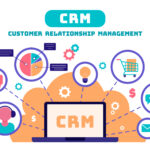Introduction: Understanding Lead Management in CRM Software
In today’s fast-paced business environment, managing leads efficiently is critical for driving sales success. Lead management in CRM software plays a pivotal role in optimizing sales processes, tracking leads, and improving overall customer relationship management (CRM). By centralizing all customer interactions and automating lead tracking, CRM software offers businesses a streamlined approach to nurture potential customers and guide them through the sales funnel.
This article delves into the importance of lead management in CRM software and how it empowers businesses to boost sales productivity, improve lead conversion rates, and foster long-term customer relationships.
1. What Is Lead Management in CRM Software?
Lead management refers to the process of capturing, tracking, nurturing, and converting leads into customers. In CRM (Customer Relationship Management) software, lead management functionalities provide sales teams with the tools to organize and prioritize leads based on their level of engagement and readiness to purchase.
A CRM system allows businesses to store all information related to potential clients in a single platform, ensuring sales teams have access to up-to-date and actionable data.
2. The Role of Lead Management in Streamlining Sales Processes
Lead management within CRM software provides a structured approach to managing the flow of leads from their initial capture to final conversion. With the integration of automated tools, businesses can:
-
Track lead interactions across multiple touchpoints, ensuring no lead is overlooked.
-
Segment leads based on demographic and behavioral data, ensuring targeted follow-ups.
-
Prioritize leads based on their engagement level, improving resource allocation.
-
Automate repetitive tasks, such as email follow-ups, to reduce manual work.
These features help streamline sales processes, ensuring that sales teams spend their time on the most promising leads.
3. How Lead Management Improves Lead Tracking and Reporting
One of the significant advantages of using CRM software for lead management is the ability to track leads effectively. Lead tracking involves monitoring the lead’s journey, from initial interest to the final purchase decision.
CRM systems often come equipped with robust reporting features, enabling businesses to:
-
Monitor lead activities, such as email opens, website visits, and social media interactions.
-
Generate real-time reports to measure lead performance, conversion rates, and sales pipeline health.
-
Analyze trends in lead data to identify patterns and predict future sales opportunities.
By leveraging these insights, businesses can make data-driven decisions that lead to higher conversion rates and a more efficient sales strategy.
4. Lead Scoring: Identifying High-Quality Leads
One of the key components of lead management in CRM software is lead scoring. This process assigns numerical values to leads based on their behavior, engagement level, and demographic characteristics. Leads with higher scores are considered more likely to convert, and they receive prioritized attention from sales teams.
For example, a lead that has visited the company website multiple times and downloaded product brochures might have a higher score compared to a lead that has only signed up for a newsletter.
Lead scoring ensures that sales teams focus their efforts on the most promising prospects, which increases the chances of conversion and enhances overall efficiency.
5. The Benefits of Automation in Lead Management
Automation is another key benefit provided by CRM software in managing leads. Automating routine tasks can save time and ensure that leads are nurtured consistently. Key aspects of lead automation include:
-
Automated follow-up emails based on predefined triggers (e.g., when a lead downloads a whitepaper).
-
Lead nurturing workflows that automatically send relevant content to leads at various stages of the sales funnel.
-
Task reminders for sales reps to follow up with high-priority leads.
By automating these aspects, businesses can ensure timely follow-ups, reduce human error, and maintain a personalized approach to lead engagement without increasing manual effort.
6. How Lead Management Enhances Communication with Leads
Effective communication is key to converting leads into customers. CRM software offers a range of tools that help businesses communicate with leads efficiently. With features like:
-
Email integration to send personalized messages.
-
SMS and chat functionality to engage leads in real-time.
-
Social media integration to track leads from platforms like Facebook, LinkedIn, and Twitter.
Sales teams can engage with leads across multiple channels while maintaining a consistent, cohesive communication strategy.
7. Lead Nurturing: Building Long-Term Relationships
Lead management in CRM software isn’t just about conversion; it’s about nurturing relationships for long-term business success. By managing leads effectively, CRM systems allow businesses to:
-
Personalize communication based on the lead’s preferences and behavior.
-
Provide value-added content at every stage of the lead’s journey, whether it’s through blogs, webinars, or case studies.
-
Educate leads about products or services that fit their needs, building trust and loyalty.
A well-executed lead nurturing strategy ensures that leads don’t fall through the cracks and are continuously engaged, even if they’re not yet ready to make a purchase.
8. Integrating Lead Management with Marketing Automation
CRM software often integrates with marketing automation tools, providing a seamless connection between sales and marketing teams. This integration is beneficial because it:
-
Aligns sales and marketing efforts, ensuring both teams work toward the same goals.
-
Tracks lead interactions across marketing campaigns, providing sales teams with valuable insights into a lead’s interests.
-
Automates lead handoff from marketing to sales, ensuring a smooth transition when a lead is ready for direct engagement.
By integrating lead management with marketing automation, businesses can create more cohesive and effective strategies for converting leads into customers.
9. Overcoming Challenges with Effective Lead Management
While lead management in CRM software offers numerous advantages, businesses can face challenges, such as:
-
Data overload: Managing a large volume of leads can be overwhelming. It’s essential to use filtering tools like lead segmentation and scoring to identify the most valuable prospects.
-
Lead stagnation: Leads that aren’t properly nurtured or followed up with in a timely manner can lose interest. Regular engagement through automation can solve this problem.
-
Inconsistent processes: Without proper guidelines, lead management efforts can become disjointed. Standardizing the process within the CRM software helps maintain consistency.
Addressing these challenges requires businesses to use the right tools and maintain a well-organized strategy for managing leads.
10. The Impact of Lead Management on Sales Growth
The direct correlation between lead management and sales growth is undeniable. By optimizing lead tracking, nurturing, and conversion processes, businesses can significantly increase their chances of closing deals. Some key benefits include:
-
Higher conversion rates: Effective lead management ensures that sales teams focus on the right leads, improving conversion rates.
-
Improved sales forecasting: With detailed lead data, businesses can predict sales more accurately and allocate resources accordingly.
-
Shorter sales cycles: Automating tasks and streamlining processes helps close deals faster, reducing the overall sales cycle.
Ultimately, lead management in CRM software plays a vital role in accelerating sales growth by ensuring a more efficient and productive sales process.
11. Conclusion: Leveraging Lead Management for Business Success
In conclusion, lead management is a critical component of CRM software that directly influences sales productivity, conversion rates, and business growth. By effectively capturing, tracking, and nurturing leads, businesses can streamline their sales processes, improve communication, and build long-term customer relationships. With the added benefits of automation, lead scoring, and seamless integration with marketing efforts, lead management in CRM software is indispensable for businesses aiming to thrive in today’s competitive market.
Investing in the right CRM system for lead management can ultimately be a game-changer for your business, ensuring that every lead is handled efficiently and converted into a loyal customer.














